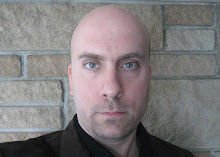Concerning the second X-Files movie (if you haven’t yet seen the move then don’t read on because my review is a spoiler). The movie is very moody and thought provoking. It’s not about aliens but about serial killing and the horror of medical technology gone off the deep end. The setting is fittingly in winter, in the snow and ice. The supernatural element of the movie is restricted to the creepy psychic link between the priest (a convicted sex-offender who is helping the FBI) and one of the villains (a boyhood victim of the priest who is also in a homosexual relationship with another one of the villains). The movie characterizes the theme of alienation and disgrace in the role of the priest, whose motives for helping the FBI remain in question throughout the movie, and also in the role of Mulder who has become an exile, no longer an FBI agent but instead living like a shut in, bearded and reminiscent of the unabomber.
Reluctantly at first, Mulder answers ‘the call of the hero’ to help the FBI in their investigation. Scully answers ‘the call’ with even more reluctance. Mulder and Scully are in fact lovers, an inevitable plot development of the series. As the story unfolds, the strength of their commitment is tested. The movie explores the conflict between religious belief (including a belief in psychic ability) and science, a conflict that constituted a major theme of the original series and that was epitomized by the interaction between Mulder (the believer) and Scully (the skeptic). In the new movie, that conflict is reserved for Scully alone, while Mulder has reconciled the two within himself. Scully, also no longer a member of the FBI, works as a full-time physician at "Our Lady of Sorrows" catholic hospital where she struggles against the somewhat faith-based values of the establishment. There is a disturbing (and intentional) parallel between the exotic crimes of the ‘Doctor Frankenstein’ character (the villain) and Scully’s efforts to apply experimental medical therapy to save the life of her patient (a young boy suffering from a terminal illness). The medical experiments of the ‘Doctor Frankenstein’ involve abduction, torture and murder (not only stealing human organs but also surgically transferring a human head to another’s body, presumably to accomplish a form of immortality). While Scully’s own medical endeavor to prolong the life of her patient (admittedly a very painful form of treatment) is neither against the will of the boy or his parents, nevertheless as Scully opposes the prevailing opinion of the establishment on the matter she is regarded as something of a villain. At the end of the movie the results of her efforts are left in question while the moral of the story is evident in her determination to not give up (to not give up on her patient and to not give up on Mulder). That moral is summarized by the subtitle of the new movie, "I Want to Believe." The statement indicates to me the struggle of the mind to grapple with a reality that it cannot comprehend but whose existence is palpable and undeniable. Understood in the context of the movie, Mulder discovered undeniable evidence of a psychic link, whereas Scully found the strength of her moral conviction to help her patient. While these are both evident to Mulder and Scully, they remain either dismissed by (or contrary to) the prevailing opinion of established authority.
The movie provokes questions about where we draw the line in relation to medical technology and its role in preserving life. What does the ‘right to life’ entail? To what extent is it ‘right’ to preserve life, to prolong a life? Also the movie provokes questions about the subject of forgiveness. Are some crimes unforgivable? Are some people unredeemable? And there is the question of trust. By what criteria do we place our trust in someone or in some form of technology or procedure? According to what values do we entrust others with power over ourselves and those we love? There is the age-old question of why does a loving God permit a child to suffer. And, of course, the age-old question of why did I spend $7.50 on that movie?

No comments:
Post a Comment